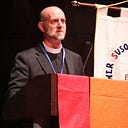Member-only story
Trust and Unity — two misunderstood terms
I watched the Presidential Inauguration on January 20th like many other people. I was curious to see what tone the new president would be setting.
I heard the word “unity” used a lot. It’s a great theme in theory. And the message was needed considering how un-united the nation is right now.
And then I heard complaints from opponents of the new President saying that he lied about wanting to be united for a variety of reasons.
I’m not interested in getting bogged down in the partisan semantics about the term unity. It’s essentially the same arguments that sprout up when the word “bi-partisanship” get thrown around. But I will say this — I think there is a big mistake playing out. That mistake is assuming that everyone shares the same definition of what unity is. I don’t think that is the case.
Unity doesn’t mean everyone agrees. Unity doesn’t mean that we allow the most resistant in society to determine what happens either. Unity isn’t about giving those out of power the sole ability to determine the direction of the nation either.
Unity gets used a lot in political speeches, but it is hardly ever defined. I think it needs to be defined so we all know what it is that we are supposedly seeking.
There can be no unity without trust. And as evidenced by a multitude of events and statements in recent months, trust is broken in this country — very broken.
